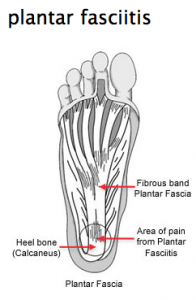Plantar Fasciitis Treatment – Downtown Vancouver
In Latin, plantar means foot and fasciitis is “inflammation”. Pronounced as “plantar fash-ee-eye-tis”, it is a simple term that defines a complex and aggravating health condition.
Plantar fasciitis affects four out of five individuals over the age of 50, while people working in active professions such as runners, joggers, dancers, waiters, firemen and policemen of all ages may suffer from heel pain, arch pain, foot inflammation, splints, tears and ruptures.
The heel pain and foot inflammation resulting from sports injuries and other accidents may effect all age groups but a more chronic condition of plantar fasciitis is experienced by people in their golden age; and those of us with ongoing health concerns, overweight conditions and pregnancy.
Plantar Fasciitis Treatment
Vancouver Everest Massage Therapy Locations
604-633-9593
MZ1- 970 Burrard St. Vancouver
(mezzanine – Electra Building)
7 days a week 8 am to 8 pm
RMT’s Treat Plantar Fasciitis – Downtown Vancouver Massage Therapy Clinic
Plantar Fasciitis treatments range from exercises, balms, gadgets, shoes, surgery and medication. However, the most commonly experienced mild and medium forms of plantar fasciitis can best be treated by massage therapy.
*Cases that require extra attention to heal may be interested in shockwave therapy, which has an excellent track record of success treating plantar fasciitis. The Electra Health Floor has a Physiotherapist who specializes in shockwave therapy (it’s painless). Read more about shockwave therapy and plantar fasciitis at the Electra Health Floor.
 Our downtown Vancouver RMT’s fully acknowledge the importance of healthy feet to our physical and emotional well-being. Accordingly, the therapists have evolved massage combinations to treat all mild to medium conditions and symptoms of plantar fasciitis.
Our downtown Vancouver RMT’s fully acknowledge the importance of healthy feet to our physical and emotional well-being. Accordingly, the therapists have evolved massage combinations to treat all mild to medium conditions and symptoms of plantar fasciitis.
The Massage Therapists at Everest Therapeutics are dedicated to utilizing advanced techniques and massage combinations to suit each individual client. Sensitive to the tissue, muscles, ligaments, joints and bones in the human body, our RMT’s encourage the foot to heal by gently coaxing its components to become flexible and begin to work well together.
While directly treating plantar fasciitis, the massage therapy treatments will also benefit the whole body. The trigger point release, Swedish massage, muscle energy, deep tissue, and soft tissue mobilization provide impetus to all our muscles, tissues, ligaments, bones, tendons and joints enabling them to move smoothly and painlessly as we live our lives.
The Causes of Plantar Fasciitis
Both the causes and the prevention of plantar fasciitis reside in the way we use and abuse our feet. We must appreciate that our feet take all our weight as they provide us mobility. Each foot is made up of 38 bones that are connected to each other by joints, ligaments, bones, tendons and tissue. When we walk or run, the ankle manages the activity and distributes the weight via the heel. At each step, some weight goes back up the heel but the major portion is absorbed by the plantar fasciitis ligament at the bottom of our feet.
- Ligaments are defined as tissues that join bones together. All movements of the foot require manipulation of this one flat ligament called plantar fascia that goes under our feet connecting our toes to the heels
- The condition of plantar fasciitis occurs when the plantar fascia ligament, a broad band of fibrous tissue, is stretched or burdened beyond its limits due to any of the following:
- The foot is subjected to occupational hardship for long periods of time
- The Plantar Fascia, along with other ligaments and muscles of the body, has become contracted and inflexible due to ageing
- The ligament is damaged by inflammation, splint, tear, or rupture in an accidental injury
- The foot suffers from ˜over-pronation” or ˜flat-foot” where the arch collapses when bearing weight, causing Plantar Fascia ligament to slip away from the heel
- The foot has an unusually high arch
- The foot has been subject to improper and ill-fitting footwear over extended periods of time
The Plantar Fasciitis Conditions
The most important factor to keep in mind about plantar fasciitis is that it is a serious, degenerating and progressive illness. When left untreated or mistreated, it can cause ongoing damage to the tissue that not only affects our current mobility but also worsens with time while aggravating other health conditions that may be present in the body such as arthritis. At its worst, it can cause splints, tears and ruptures in the ligament disabling the foot altogether.
Mild Plantar Fasciitis
Most of us may have experienced the mild form of plantar fasciitis, where the plantar fascia ligament is swollen because of sudden stress or a light injury to the foot. This condition is painful but not unbearable; and it may prohibit us from walking for 24 to 36 hours. However, it does heal in 2-3 days with rest and tender care.
The mild plantar fasciitis inflammation and pain persists in old age and becomes a part of our lives where we only experience short periods of relief after treatments. Even in its mild form, plantar fasciitis becomes the most aggravating and disorienting condition for people who bear it on ongoing basis.
Medium Plantar Fasciitis
This condition is worsening of the mild plantar fasciitis where the ligament, instead of healing in a couple of days, continues to send sharp or dull pain in the areas of foot arch and heel. Based on our experience with our clients, this condition is often caused by minimizing the off time required to heal or by delaying a special treatment because of occupational commitments. It has been observed in athletes, and in people from lower income groups.
Acute Plantar Fasciitis
When plantar fascia ligament is damaged to the level of being torn, splinted or ruptured, the result is an acute, sharp and continuous pain and complete disabling of the foot. This condition may require plantar fasciitis surgery.
People suffering from mild, medium or acute forms of Plantar Fasciitis experience the most pain in the “post-rest” and “overuse” conditions.
The post-rest pain follows any period of rest such, as when we wake up in the mornings and late afternoons; or after prolonged periods of sitting. When the foot is inactive for a couple of hours, the ligament begins to shrink, making it difficult to put the foot down on the ground. The post-rest of plantar fasciitis is characterized by sharp but short-lived pain in the foot. In most cases, the pain subsides in about 10 minutes as the ligament regains elasticity by warming up.
The pain in the overuse situation differs from Post-Rest, as it is caused by prolonged periods of activity such as running, jogging or other ongoing physical conditions where the feet experience abuse. The pain resulting from overuse plantar fasciitis produces dull but continuous throbs that emanate from the bottom and sides of the foot.
Plantar Fasciitis Treatment
Downtown Vancouver Everest Massage Therapy Locations
604-633-9593
MZ1- 970 Burrard St. Vancouver
(mezzanine – Electra Building)
7 days a week 8 am to 8 pm
The RMT tip of the day
Here is a simple Yoga exercise to keep the feet healthy and in good shape. It can be done while standing or sitting on a straight-backed chair.
Raise the foot 6 to 9 inches above the floor, relax the muscles in your body, bring the toes together, move the foot clockwise from the ankle in a slow circular continuous motion; begin by making 6 circles. Repeat on the other foot.
Observe and experience the relief each slow circle sends to the toes, arch, heel, ankle and the leg.
Downtown Vancouver Plantar Fasciitis Treatment
To book an appointment (online) with one of our RMT’s for plantar fasciitis treatment click here or call us at 604-633-9593
Overall rating of 100+ Google reviews
5.0 out of 5 STARS
[authorship]





